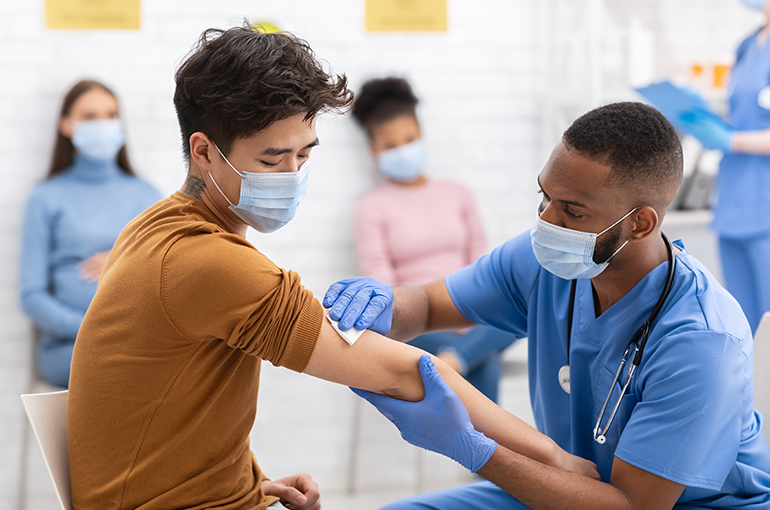- FR
- EN
Cinq raisons de se faire vacciner
(Article en anglais) SCOR calls on (re)insurers to help convey the broad health benefits of getting the Covid-19 vaccination

60%. That’s the estimated percentage needed to create herd immunity, said to be our best chance to overcome Covid-19 as a society. Despite the fits and starts of production, storage, transportation, and delivery, further challenged by newly emerging variant strains of the original virus, the ability to create herd immunity is in sight. While governments are endeavoring to increase the availability of vaccines, we as global citizens should be preparing to receive them. Unfortunately, many remain skeptical, even fearful, of getting a Covid-19 vaccination.
Several misconceptions and questions are feeding this fear. We as (re)insurers have a responsibility to help people understand the health and societal benefits of “getting the jab”.
Five reasons to get the jab
1. It’s not as “new” as we think: Skeptics have said that the vaccine was “rushed into production” or ‘is “too new”. The reality is that both the adenovirus and the Messenger RNA (mRNA) vaccination delivery methods have been studied and tested for years. And the speed at which the vaccines were produced is not a reflection of rushing, but of the immense advances in technology and data modeling over the past decades.
2. The vaccines do not put you at risk of contracting Covid-19: Both the mRNA and adenovirus vaccines enable us to combat Covid-19 without risking the introduction of the actual virus itself. Put simply, an mRNA vaccine only serves to deliver instructions to our cells on how to identify and fight the virus. This is unlike traditional vaccines, in which weakened live viruses are injected so that the body can recognize and fight the intruding pathogen. Meanwhile the adenovirus vaccine uses a virus that is safe, yet similar to Covid-19, to “trick” the body into producing antigens that will allow the inoculated to combat a Covid-19 infection. As the adenovirus is easily controlled, the only thing left behind in the body is the knowledge of how to fight Covid-19. Any possible symptoms from the actual adenovirus are minimal.
3. The side effects are minimal: Another common concern among those wary about getting the vaccine are the potential side effects. In clinical trials, the side effects of the vaccine are similar in nature to those experienced by trial patients receiving a placebo injection. Such side effects include swelling/discomfort at the injection spot, fever, headache and diarrhea, among other temporary symptoms. The placebo generated a significant number of complaints of side effects, with almost ¼ of the population reporting some issue. However, it must be noted that the vaccine does have an impact on individuals with a history of severe allergic reactions; methods to support such people now are in place.
Skeptics of the mRNA vaccine also worry about its impact on our DNA, yet there is no way for mRNA to enter the nucleus of a cell and coexist with our DNA. mRNA cannot live long in the body, so once the delivery of information is completed, mRNA cells die and are expelled – only the memory of the attack-plan remains.
4. There is no risk to other illnesses or conditions: Another common misconception is that being vaccinated could aggravate the comorbidities that are known to provoke the most severe versions of the virus (diabetes, heart disease, respiratory issues, obesity, etc.). This is untrue. As the vaccine does not introduce the virus into the body, there is no risk that an existing comorbidity would be impacted, or worse that the vaccine would provoke Covid-19.
5. Everyone should play their part: Turning now from the skeptics to those who don’t think they need to be vaccinated because they are not at risk, such as young adults and people in good health. The first misconception is that young adults are not at risk – the sad reality is that thousands aged 25-44 have already died. But aside from alleviating our own individual risk, this is an act for the greater good and the protection of society. It is our civic responsibility to get the vaccine to protect everyone, not just ourselves.
Time will tell how effective the long-term immunity is, and adjustments will be made as more data is collected. The one thing that is certain is that the more we develop immunity to Covid-19, the less the disease will spread, leading to fewer hospitalizations and deaths and helping us to move more quickly to the new, post-Covid-19 normal.
When it’s your turn, get the jab and encourage others to do the same. If we all do our part in this great global effort, we will each contribute to overcoming this pandemic.